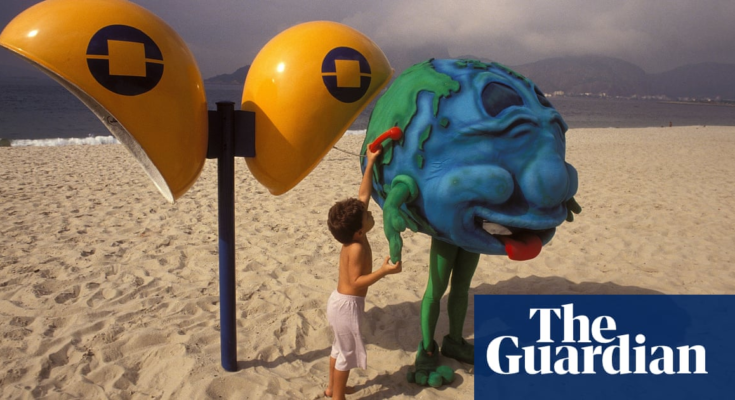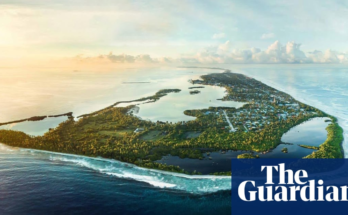How Guardian journalists reported on the long, twisting road to global action on the climate crisis
Sat 30 Oct 2021 12.00 EDT
From the earliest global environment conference in the 1970s, through the Rio Earth Summit and 25 subsequent Cops, Guardian journalists have reported on every twist and turn of these gargantuan gatherings, which have attracted hundreds of thousands of delegates over the years.
Stockholm 1972
At the first UN conference to make the environment a major issue, our correspondent Malcolm Stuart found delegates dealing with issues as varied as Native American reservations, Concorde’s emissions and the beginning of the end for DDT.
He also spotted something neat that Boris Johnson would claim to have invented 40 years later.
One of the success stories of the conference [is] the little blue and white bicycles parked outside the main buildings used by the UN delegates, UN staff and the press, who have particularly taken to them, sign out a key which fits a lock of any machine. By lunchtime yesterday every key was taken.
Rio Earth Summit, 1992
The Earth Summit, held on the 20th anniversary of Stockholm, was the moment when “global warming” became a household term. And as John Vidal found out, some of the central issues were the same then as they are today.
As the Rio conference opened yesterday, it was becoming increasingly clear that what is at stake is not the environment or poverty but institutional change and, especially, money.
In the game of diplomatic bridge now taking place in Rio, the north controls the bank. The south, dealt an appalling hand, with equity its only high card, has little leverage except in controlling the physical resources the north needs.
Even in these early days, the grand bargain was apparent: in return for forswearing the decades of carbon-fuelled growth that western powers had enjoyed, the developing world would get technology – and cash, as Paul Brown wrote.
The richest – Brazil, India and Malaysia – want access to new technology, while the poorest simply want cash for urgent development to lift them off the bottom of the economic pile.
Rio gave birth to the mouthful that is the UN Framework Convention on Climate Change, with the provision that all 197 countries that ratified it would have a seat at the annual “conference of the parties” or Cops, the first of which took place in …
Berlin, 1995 (Cop1)
The then Guardian environment editor, Paul Brown, was present at the inaugural Cop, alongside diplomats, lobbyists and activists from more than 130 countries.
News editors the world over yawned last week when history was being made at the World Climate Conference in Berlin – and it is not surprising: tedious 6am wrangling over words in square brackets grips readers less than murderers facing the electric chair. Not that there was a lack of passion at the conference; at least millions and probably billions will live or die as a result of the action which will follow the Berlin Mandate, as the final document that emerged is to be called.
If that sounds like hyperbole, then you did not hear the anguished statements from the 32 members of the Alliance of Small Island States. They thought the mandate was not enough: the vested interests of the industrialised world had left them facing extinction as nations by the middle of the next century. The lumbering negotiation process would yield too little too late to stop the worst effects of climate change.
Jokes from the fossil fuel lobby that if these dire predictions prove right and some nations sink beneath the waves it will alter the voting pattern in their favour, did not improve the tone nor the temper of the delegates.
Not for the last time, the devil was in the detail – much to the frustration of everyone, Brown included.
What the argument was about was chiefly what was known in Berlin jargon as the “R” word – reductions. It took a week to decide whether the word “reductions” could or could not be included; hundreds of hours were expended by people in corridors trying to persuade them yes, it could be, or no, it could not. A similar length of time and many hours sleep were lost worrying about the two “T” words – targets and timetables.
In the end the “R” and the “T” words were in the final text. The Berlin Mandate talks of reductions in greenhouse gases, targets needing to be considered, and timetables worked out. But there was none of the firm commitments that the hardline greens wanted, or the climate scientists recommended.
Geneva 1996 (Cop2)
Paul Brown was again on hand to report on a significant US endorsement of targets to cut emissions, and a colourful speech by the UK environment secretary, John Gummer, who seized on the urgency of the hour in a speech:
I do not think anyone in this hall is so old that he or she will not be affected by climate change unless he or she falls under a tram here in Geneva before the end of the conference.
Kyoto 1997 (Cop3)
Brown was racking up his own emissions count as he headed for Kyoto and an agreement disparaged by a Guardian editorial as “a tentative stab at tackling a problem already soaring out of control”.
The Kyoto protocol, not fully ratified until 2005, committed countries to legally binding greenhouse gas emissions targets, though there were some all-important caveats. Brown wrote:
This patched-up deal does not bode well for an agreement supposed to usher in a brighter and cleaner millennium, and it was only achieved after a cynical trade-off between China and the US. The developing countries are now not required to sign up to voluntary reductions of greenhouse gas emissions – a commitment that China had led the way in resisting. Washington in return has won the right to keep the principle of “emissions trading” – to which almost everyone else objected – in the treaty. Decisions on how to conduct the trading are deferred till a follow-up meeting next November. But everyone knows that there is no chance of the US ratifying the treaty unless these are worked out.
Not for the first – or last – time, the negotiations were so tricky that a deal didn’t emerge until dead of night, as Brown noted:
A more bizarre way of reaching an agreement to tackle global warming early next century cannot be imagined. Half those involved were asleep on the floor, chairs or tables, unaware that history was being made.
Buenos Aires 1998 (Cop4)
A fudge of a conference which Paul Brown and the Observer’s John Arlidge described as “two weeks of ill-tempered talks”. But Brown also noted the enthusiasm with which big polluters took up the new carbon trading system, in an early sign that market forces might be a force for both good and bad.
Bonn 1999 (Cop5)
A technical conference, one of the few Cops not attended by Guardian correspondents. But to concentrate minds, Brown published a grave warning during the second week of talks:
The Hague 2000 (Cop6)
Brown was on hand once again for one of many low points in the Cop process, as disagreements over the devilish detail of Kyoto brought the conference to an impasse. In particular, there was fury at US attempts to soften its carbon reduction targets by claiming that forests had done half its work for it already.
[The US claimed] that existing forests had soaked up so much carbon from the atmosphere since 1990 that it cancelled out about half of all the emissions Americans created from burning fossil fuels…
As a concession, the Americans announced on Monday that they were prepared only to claim part of the total for existing forests. But overnight, EU scientists studied the proposal and claimed this … was such a “massive loophole” that it rendered US promises made in Kyoto meaningless.
The Hague talks ended in failure, and required negotiators to return to have another go in …
Bonn 2001 (Cop6 cont)
… where a watered-down deal saved the Kyoto protocol, albeit with the US (now under George W Bush) pulling out. Brown cited a New Zealand minister as saying: “We have delivered probably the most comprehensive and difficult agreement in human history.”
Marrakech 2001 (Cop7)
A meeting to finalise operational details around emissions trading and a compliance regime to verify emissions targets. The US remains on the outside looking in.
New Delhi 2002 (Cop8)
A forgettable conference held just months after Australia joined the US in rejecting the Kyoto process. This Cop produced a thin declaration and signs that other big players such as Russia were wavering on Kyoto-mandated reductions, as the US maintained its intransigence, according to the Guardian reporter on the scene, Luke Harding.
An editorial entitled “Dirty dealing in Delhi” chuntered:
The US remains a country which is powered by coal, where people instinctively drive rather than walk and where masses let the plane take the strain. George Bush’s message … is clear: the American way of life is not up for negotiations.”
Milan 2003 (Cop9)
Paul Brown was back in action, reporting on efforts by small states to secure funding to help them adapt to climate change – a key component of the Cop agreements over the years.
Buenos Aires 2004 (Cop10)
Unremarkable Cop. If you can remember it, you weren’t there.
Montreal 2005 (Cop11)
Environment correspondent David Adam was on hand at the first Cop to be held in North America, to witness another US hissy fit, as the rest of the world agreed to extend the Kyoto agreement. This time, the lowly duck was the metaphor du jour, as Adam wrote:
The chief US negotiator Harlan Watson walked out of talks on Friday after complaining that draft text proposals amounted to a call for negotiations which President George W Bush opposes.
Baffling some foreign ministers, Watson told the high-level meeting: ‘If it walks like a duck and quacks like a duck it’s a duck.’ US green campaigners quickly bought all the plastic ducks they could find in surrounding shops and handed them out to delegates and the media.
Nairobi 2006 (Cop12)
The east Africa correspondent, Xan Rice, witnessed glacial progress in Nairobi on what to do once the Kyoto deal runs out in 2012. His piece ran under the headline “Little progress at climate summit”, a title that recurred more than once over the years.
Bali 2007 (Cop13)
David Adam packed his summer wardrobe for one of the more agreeably located Cops, where proceedings were dominated by negotiations on a successor to Kyoto. But with strong disagreements over specific targets, negotiators ultimately reached for one of the words of the decade to describe a situation where everyone agrees that progress is necessary but no one can agree on how. The Bali “roadmap” was born.
Even the light relief was excruciating, as Adam reported:
A formal session to open the high-level section of the UN climate talks was interrupted by an invitation to enjoy one of the Indonesian president’s songs. Heads of government squirmed in their seats as the song’s video, complete with smiling children and burning forests, was beamed on to a screen and an aide urged them to sing along. President Susilo Bambang Yudhoyono is a minor pop star in Indonesia. Asked if he had enjoyed the performance, Hilary Benn said: “I’ve enjoyed all of it so far but I don’t plan to sing.”
Adam later recalled another telling anecdote from the conference.
Inside the cavernous hotel auditorium hosting the negotiations, something extraordinary happened. Faced with angry accusations from the Chinese that he was allowing parallel discussions outside the room, Yvo de Boer, the UN’s top climate official, broke down in tears and had to be helped from the platform. A ripple of supportive applause swelled to a standing ovation – a rare moment of unity that appeared to nudge the talks back on track. A few hours later, the world’s politicians were able to agree and head home.
Poznan, Poland 2008 (Cop14)
Adam was on the case in Poznan a year later, where negotiations still revolved around a successor to Kyoto … but more attention seemed to be focusing on planning for Cop15, which was billed as a last-chance saloon.
Copenhagen 2009 (Cop15)
Where to begin? The most important conference since Kyoto had been billed as the moment that countries would commit to deep cuts in carbon emissions. In fact, it produced only more vague promises, and was described as “a bruising conflict,” “a fortnight of fraught and sometimes machiavellian negotiations” and “two weeks of subterfuge” by the unprecedented number of Guardian correspondents in attendance.
One of the finest pieces of writing to come out of any Cop was this assessment by John Vidal and Jonathan Watts in the Danish capital, which brutally exposed how bitter, deceitful and melodramatic these meetings can become.
In the last 24 hours, it became negotiation by leak. Secret documents were deliberately left on photocopiers, others were thrust into journalists’ hands or put on the web. People were photographing them and handing them around all the time. All eight versions of the final text that world leaders were asked to sign up to were leaked within minutes of being published. The talks repeatedly teetered on the brink of collapse.
Cancún, Mexico, 2010 (Cop16)
“After the catastrophe in Copenhagen came the compromise in Cancún,” wrote the environment editor, Damian Carrington, in December 2010.
John Vidal and Suzanne Goldenberg were in the Mexican resort to watch the show just about get back on the road. They called the agreement “a modest deal that for the first time commits all the major economies to reducing emissions, but not enough to meet their promise of keeping the global temperature rise to 2C”.
Cancún also provided for a $100bn a year Green Climate Fund to shield more vulnerable countries from climate change – but did not specify where this money would come from.
Durban, South Africa, 2011 (Cop17)
Another COP, another set of “marathon talks”, this time observed by John Vidal and Fiona Harvey. The main outcome was a new commitment to conclude a climate change treaty, which would set the parties on course for the triumph in Paris four years later.
Noting that the talks culminated in a single 60-hour negotiation session, Vidal and Harvey wrote:
Negotiators agreed to start work on a new climate deal that would have legal force and, crucially, require both developed and developing countries to cut their carbon emissions. The terms now need to be agreed by 2015 and come into effect from 2020.
Doha, 2012 (Cop18)
Cops are creative with language, if nothing else. This one produced a weak agreement that sounded like a 1970s rock band: The Doha Climate Gateway. Unfortunately, no one could really explain what it did, other than prevent the movement from stalling.
Commentator Michael Jacobs wrote:
It is almost a ritual now for UN climate change negotiations to reach the brink of collapse before a nail-biting, past-the-deadline compromise is achieved. But the tortuous conclusion to this year’s talks in Doha, Qatar, only sets the stage for a much bigger drama three years hence, in 2015, when a new comprehensive agreement must be reached.
Warsaw 2013 (Cop19)
Fiona Harvey was in Warsaw to see countries agree to set out their targets for cutting greenhouse gas emissions by 2015. The big question was: what would those targets be?
Weary delegates trudging home from an exhausting and sleep-deprived fortnight of climate change talks in Warsaw may be unwilling to acknowledge it, but the hard work is just beginning. Like schoolchildren after a packed day of lessons, they have been sent back to their national capitals to “do their homework”.
Lima 2014 (COP 20)
Like many of its fellow Cops, Lima overran and underdelivered. Negotiators did little more than tee up the 2015 Paris conference by committing all countries to take action against climate change.
The plan was grandly labelled the Lima Call for Climate Action, but you could sense the weariness from the Guardian correspondent Suzanne Goldenberg in the Peruvian capital.
Much remains vague or poorly defined. The countries put off decisions about the legal structure of the agreement, and deferred decisions about ensuring a flow of finance to developing countries.
The biggest issue left unresolved for Paris is the burden for cutting greenhouse gas emissions. The draft text retains language of “common but differentiated responsibilities” that has over the years given developing countries a pass on cutting emissions.
Paris 2015 (Cop21)
The uber-Cop. The Guardian has written more about this conference than any other Cop, and a clutch of writers dispatched to Paris summed up the biggest moment since Rio thus:
After 20 years of fraught meetings, including the past two weeks spent in an exhibition hall on the outskirts of Paris, negotiators from nearly 200 countries signed on to a deal on Saturday evening that set ambitious goals to limit temperature rise and hold governments to account for reaching those targets.
Lenore Taylor, over from Australia to watch history in the making, made some wry observations of the nature of deal-making, Cop-style
They would be “making history”, it was a “moment of truth”, it would go down as “a major date in the history of mankind”, there would never be another chance, the future of the world, quite literally, depended upon the decision they were about to make that moment. And then they broke for lunch. The meeting was in France, after all.
And a Guardian leader opined:
The Paris COP 21 talks surpassed expectations… demonstrating just how much can be achieved by determined diplomacy, even while working within the unbending red lines of jealously sovereign states… Everyone offered up voluntary emission targets, and agreed, too, to a five-yearly review of these. While the targets on the table are not yet adequate to avoid the disaster of more than 2C of warming, the surprise inclusion of an aspiration to cap temperature rises at 1.5C signals a shared understanding that the targets will have to be tightened at each successive review.
Marrakech 2016 (Cop22)
A quieter summit, focused on the African experience of climate change – water stress, land degradation, rising temperatures and deforestation, as Celeste Hicks on the scene noted.
Bonn 2017 (Cop23)
The environment editor, Damian Carrington, was in the old federal German capital to observe efforts to convert the Paris agreement from a symbolic moment into a set of binding rules for carbon reduction. Donald Trump’s move to pull the US out of Paris backfired by making the rest of the world more committed to the deal.
Katowice, Poland 2018 (Cop24)
A key element decided here was the rulebook for putting the Paris agreement in place, including how governments will measure, report and verify their emissions-cutting effort, as Fiona Harvey on the ground in Poland reported.
Madrid 2019 (Cop25)
Perhaps the most precarious Cop of all, it was to have taken place in Brazil, until the denialist president, Jair Bolsonaro, decided he wasn’t in the mood to host. Santiago stepped into the breach, but had to withdraw amid massive demonstrations and riots about corruption and the cost of living.
So it fell to Madrid to rescue things, though Fiona Harvey found few participants willing to come up with more ambitious targets to cut greenhouse gas emissions in order to meet the terms of the 2015 Paris accord.
Glasgow 2021 (Cop26)
You can follow all the action here.
Support urgent, independent climate journalism
{{topLeft}}
{{bottomLeft}}
{{topRight}}
{{bottomRight}}
{{/ticker}}
{{heading}}
{{#paragraphs}}
{{.}}
{{/paragraphs}}{{highlightedText}}
{{#choiceCards}}{{/choiceCards}}



